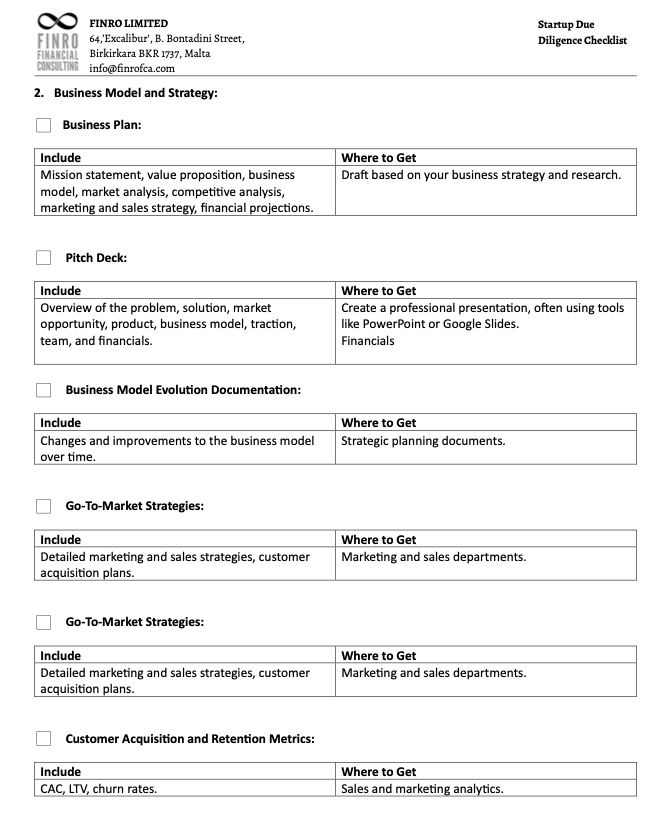The Hidden Benefits of Financial Due Diligence: Finding Growth Opportunities
By Lior Ronen | Founder, Finro Financial Consulting
Financial due diligence (DD) plays a pivotal role in any investment deal. It involves a thorough review of a company's financial records, legal documents, and other key information to identify potential risks that could impact the investment's success.
Traditionally, this process has centered on uncovering red flags and deal breakers. However, there's another dimension to financial due diligence that often goes unnoticed: the identification of growth opportunities.
By taking a closer look at a company's financials, operations, and market potential, investors can uncover hidden avenues for cost savings and new revenue streams. This approach not only mitigates risks but also enhances the overall value of the investment.
In this article, we will explore the benefits of adopting a growth-focused perspective in financial due diligence and provide practical suggestions for conducting a comprehensive review that goes beyond merely finding problems.
Financial due diligence traditionally focuses on identifying risks and deal breakers by analyzing financial statements, tax returns, and legal documents, but this risk-centric approach often overlooks growth opportunities. By adopting a growth-focused perspective, investors can uncover hidden revenue streams, market expansion possibilities, and cost-saving measures, while still addressing potential risks proactively.
This method involves a deep dive into financial data, evaluating the customer base, reviewing strategic roadmaps, analyzing market and competition, and assessing operational efficiencies. The result is a more comprehensive understanding of a company's true potential, leading to improved valuations, long-term success, and more informed investment decisions.
- The Traditional Approach to Financial Due Diligence
- Limitations of Traditional Financial Due Diligence
- The Benefits of a Growth-Focused Approach to Financial Due Diligence
- Key Areas to Focus on for Growth-Focused Financial Due Diligence
- Conducting Effective Growth-Focused Financial Due Diligence
- Conclusion
The Traditional Approach to Financial Due Diligence
Financial due diligence (DD) has long been a cornerstone of the investment process, primarily focusing on identifying risks and potential deal breakers.
This traditional approach involves a meticulous examination of financial statements, tax returns, and legal documents to ensure that no major issues could jeopardize the success of a deal.
Financial Statements
Investors and their advisors typically scrutinize a company's financial statements to gain insights into its financial health, profitability, and cash flow. They examine revenue, expenses, assets, and liabilities to identify any potential problems or discrepancies that could affect the investment.
Tax Returns
Analyzing a company's tax returns provides a detailed view of its financial history and tax obligations. This review helps investors understand the company's tax liabilities and ensures that there are no hidden tax issues that could pose risks to the deal.
Legal Documents
A thorough review of legal documents is also a critical component of traditional financial DD. This includes contracts, agreements, and leases, which offer valuable information about a company's legal obligations and potential liabilities. Understanding these documents helps investors assess the overall legal risk associated with the investment.
While the traditional approach to financial due diligence is essential for identifying risks, it often falls short in uncovering growth opportunities. By focusing solely on potential deal breakers, investors might miss out on valuable insights that could drive growth and enhance the value of their investment.
This is where a growth-focused approach to financial due diligence comes into play, offering a more comprehensive perspective that not only identifies risks but also highlights opportunities for expansion and improvement.
 |
Click to Recieve The Full Checklist Now: Finro Startup Due Diligence Checklist |
Get your expert support now!
Limitations of Traditional Financial Due Diligence
While traditional financial due diligence is indispensable for identifying risks and protecting investments, it has its limitations.
The primary focus on uncovering red flags and deal breakers means that this approach can sometimes overlook potential growth opportunities.
By concentrating mainly on mitigating risks, investors might miss valuable insights that could enhance the investment's value and drive the company's future success.
Risk-Centric Approach
The conventional method of financial DD is inherently risk-averse. It emphasizes identifying issues that could negatively impact the deal, such as discrepancies in financial statements, tax liabilities, or legal risks. While this is crucial for safeguarding investments, it can result in a narrow perspective that prioritizes avoiding losses over seeking gains.
Missing Growth Opportunities
A risk-centric approach tends to miss the broader picture. It often fails to identify potential avenues for growth and improvement within the company. Opportunities for cost savings, new revenue streams, and market expansion can go unnoticed if the due diligence process focuses solely on finding problems.
Need for a Broader Perspective
Investors today require a more holistic view of potential investments. A growth-focused approach to financial DD identifies risks and uncovers opportunities that can drive the company's future success.
By broadening the scope of due diligence, investors can gain a deeper understanding of a company's potential, leading to more informed and strategic investment decisions.
Incorporating a growth-focused perspective into financial due diligence provides a more comprehensive investment opportunity evaluation. It allows investors to see beyond immediate risks and recognize long-term growth and profitability potential. This balanced approach not only mitigates risks but also maximizes the value and potential of the investment.
The Benefits of a Growth-Focused Approach to Financial Due Diligence
While traditional financial due diligence focuses on identifying risks, a growth-focused approach broadens the scope to uncover potential opportunities for enhancing the value and success of an investment. By shifting the perspective from solely risk aversion to also seeking growth possibilities, investors can gain deeper insights into a company's true potential.
Identifying New Revenue Opportunities
A growth-focused approach allows investors to analyze a company's strategy, operations, and market dynamics in depth. This fresh perspective can reveal untapped markets, new revenue streams, and business opportunities that the company may not have previously considered. For example, investors might identify potential for expanding product lines, entering new geographic markets, or leveraging existing assets in innovative ways.
Proactively Addressing Potential Problems
Growth-focused financial due diligence is not just about finding opportunities; it also involves identifying risks and addressing them proactively. By understanding the operational, sales, marketing, and strategic risks early on, investors can develop mitigation plans and suggest solutions to prevent these issues from escalating. This proactive approach helps in managing risks more effectively and supports the overall growth strategy.
Improving Valuation
One of the significant advantages of identifying growth opportunities during due diligence is the potential for improving the company's valuation. Companies with clear paths to growth are often valued higher than those without such prospects. By uncovering these opportunities, investors can better understand the company's future potential, leading to more accurate and favorable valuations. This can result in better investment decisions and potentially higher returns.
Supporting Long-Term Success
A growth-focused approach to financial due diligence aligns with the goal of building a robust and sustainable business. By identifying and pursuing opportunities for growth, investors can help the company develop a solid foundation for long-term success. This approach not only enhances the immediate value of the investment but also contributes to the company's enduring viability and competitiveness in the market.
By incorporating a growth-focused perspective into financial due diligence, investors can transform the process from merely a risk management exercise into a strategic tool for uncovering hidden value and driving future growth. This comprehensive approach ensures that investments are not only protected from risks but also positioned for long-term success and profitability.
| Aspect | Traditional Financial Due Diligence | Growth-Focused Financial Due Diligence |
|---|---|---|
| Primary Focus | Identifying risks and deal breakers | Uncovering growth opportunities alongside risks |
| Financial Statements | Analyze for discrepancies and issues | Analyze for insights into potential growth areas |
| Tax Returns | Ensure compliance and identify tax liabilities | Review for historical financial health and future tax optimization |
| Legal Documents | Assess legal risks and obligations | Assess legal risks and explore opportunities for favorable contracts and agreements |
| Approach to Risks | Risk-averse, focused on avoiding losses | Balanced, focusing on proactive risk management and mitigation |
| Growth Opportunities | Often overlooked | Central focus, identifying new revenue streams and market expansion opportunities |
| Valuation Impact | Limited to risk mitigation | Enhanced by revealing true value potential through growth prospects |
| Long-Term Perspective | Short-term risk avoidance | Long-term success and sustainability by building robust growth strategies |


